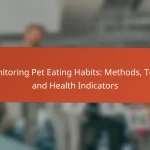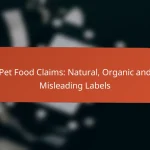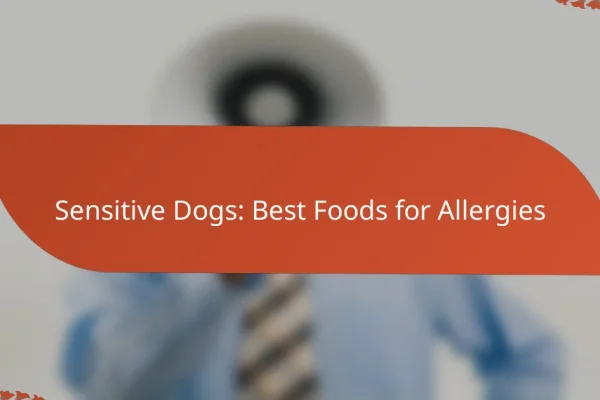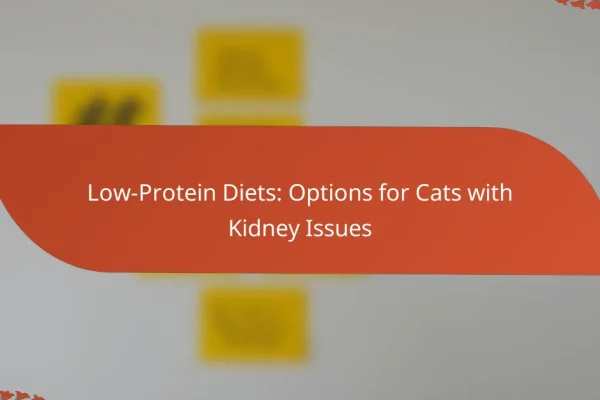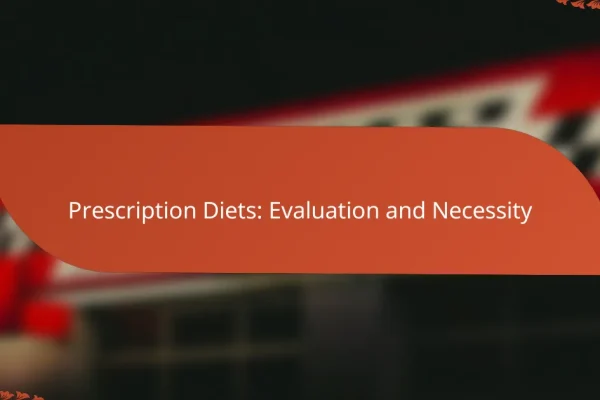What are the best special diets for dogs?
The best special diets for dogs vary based on health needs, allergies, and lifestyle. Common options include grain-free, raw food, prescription, and homemade diets, each with unique benefits and considerations.
Grain-free diets
Grain-free diets eliminate grains like wheat, corn, and soy, focusing instead on proteins and vegetables. This type of diet may benefit dogs with grain allergies or sensitivities, promoting better digestion and skin health.
When considering a grain-free diet, ensure it includes high-quality protein sources such as chicken, fish, or lamb. Always consult with a veterinarian before making significant dietary changes to avoid nutritional deficiencies.
Raw food diets
Raw food diets consist of uncooked meat, bones, fruits, and vegetables, aiming to mimic a dog’s natural diet. Proponents argue that this diet can improve coat condition, energy levels, and overall health.
However, raw diets can pose risks, including bacterial contamination and nutritional imbalances. It’s crucial to research and follow safe handling practices, and consider consulting a veterinarian for guidance on balanced meal planning.
Prescription diets
Prescription diets are specially formulated to address specific health issues, such as kidney disease, obesity, or food allergies. These diets are available through veterinarians and are tailored to meet the unique nutritional needs of affected dogs.
When using a prescription diet, follow your veterinarian’s recommendations closely. These diets often require strict adherence to ensure they effectively manage the dog’s health condition.
Homemade diets
Homemade diets allow pet owners to control the ingredients and tailor meals to their dog’s preferences and health needs. This approach can be beneficial for dogs with food sensitivities or specific dietary requirements.
To create a balanced homemade diet, include a variety of proteins, carbohydrates, and vegetables. Consulting a veterinarian or a pet nutritionist is advisable to ensure the diet meets all nutritional requirements and avoids deficiencies.
What are the best special diets for cats?
The best special diets for cats depend on their health needs, age, and lifestyle. Common options include high-protein, low-carb, and wet food diets, each offering unique benefits tailored to specific feline requirements.
High-protein diets
High-protein diets are designed to mimic a cat’s natural prey-based nutrition, which is essential for their energy and overall health. These diets typically contain 40% or more protein, sourced from meat, fish, or poultry.
When considering a high-protein diet, look for products with high-quality protein sources listed as the first ingredient. Be cautious of fillers and by-products that may dilute the protein content.
Low-carb diets
Low-carb diets for cats focus on reducing carbohydrate intake, which can be beneficial for weight management and diabetes control. These diets generally contain less than 10% carbohydrates, promoting fat as the primary energy source.
To implement a low-carb diet, choose foods that prioritize animal proteins and healthy fats. Monitor your cat’s weight and health regularly to ensure the diet is effective and well-tolerated.
Wet food diets
Wet food diets provide higher moisture content, which is crucial for maintaining hydration and urinary health in cats. These diets often contain around 75% moisture, making them a good choice for cats that may not drink enough water.
When selecting wet food, check the ingredient list for quality proteins and avoid those with excessive fillers. Incorporating wet food can also help with weight management, as it tends to be lower in calories compared to dry kibble.
How to choose a special diet for pets?
Choosing a special diet for pets involves understanding their unique health needs and dietary requirements. It is essential to consider factors such as age, weight, health conditions, and activity level to ensure the diet supports their overall well-being.
Consulting a veterinarian
Consulting a veterinarian is a crucial first step in selecting a special diet for your pet. A vet can provide tailored advice based on your pet’s specific health status and nutritional needs. They may recommend specific brands or formulations that align with your pet’s health goals.
Regular check-ups can help monitor your pet’s health and adjust their diet as needed. Always discuss any changes in your pet’s behavior or health with your veterinarian to ensure the diet remains appropriate.
Assessing pet health conditions
Assessing your pet’s health conditions is vital when choosing a special diet. Common issues like allergies, diabetes, or kidney disease require specific dietary adjustments. For instance, pets with allergies may benefit from a limited ingredient diet, while those with diabetes may need low-carbohydrate options.
Keep an eye on your pet’s weight and overall condition. If you notice changes such as excessive weight gain or loss, consult your veterinarian to reassess their dietary needs.
Evaluating dietary needs
Evaluating your pet’s dietary needs involves understanding their life stage, activity level, and any specific health concerns. Puppies and kittens require diets rich in protein and calories, while senior pets may need lower-calorie options to prevent obesity.
Consider using a balanced diet that includes proteins, fats, carbohydrates, vitamins, and minerals. Reading labels can help you ensure that the food meets the nutritional standards set by organizations like the Association of American Feed Control Officials (AAFCO).
What are the benefits of special diets for pets?
Special diets for pets offer numerous advantages, including enhanced overall health, better management of allergies, and effective weight control. These tailored nutritional plans can significantly improve a pet’s quality of life and longevity.
Improved health
Special diets can lead to improved health by providing pets with the specific nutrients they need for their unique conditions. For instance, diets rich in omega-3 fatty acids can support joint health and reduce inflammation.
When considering a special diet, consult with a veterinarian to ensure it meets your pet’s specific health requirements. Regular monitoring and adjustments may be necessary to optimize health benefits.
Allergy management
Pets with food allergies can benefit greatly from special diets designed to eliminate allergens. These diets often contain limited ingredients, making it easier to identify and avoid problematic foods.
Common allergens include beef, dairy, and wheat, so a hypoallergenic diet may substitute these with alternative protein sources like fish or duck. Always introduce new foods gradually to monitor for adverse reactions.
Weight control
Special diets can assist in weight control by providing balanced nutrition while managing calorie intake. These diets typically include higher fiber content to promote satiety without excessive calories.
For effective weight management, consider portion control and regular feeding schedules. Consult your veterinarian to determine the appropriate caloric intake based on your pet’s age, breed, and activity level.
What are the risks of special diets for pets?
Special diets for pets can pose several risks, including nutritional deficiencies and digestive issues. It’s crucial to understand these potential problems to ensure your pet’s health is not compromised.
Nutritional deficiencies
Special diets may lack essential nutrients that pets require for optimal health. For example, a homemade diet might miss vital vitamins and minerals, leading to deficiencies over time.
Common deficiencies include inadequate protein, calcium, or certain fatty acids. Regular veterinary check-ups and blood tests can help identify any nutritional gaps in your pet’s diet.
Digestive issues
Changing a pet’s diet can lead to digestive problems such as diarrhea, vomiting, or constipation. These issues often arise when pets are introduced to new ingredients too quickly or if the diet is not balanced.
To minimize digestive disturbances, transition to a new diet gradually over a week or more. Monitor your pet for any adverse reactions and consult a veterinarian if symptoms persist.

